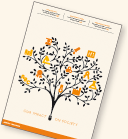Introduction
A message from Robin Freestone
Pearson is a company with a strong sense of purpose. As Marjorie sets out in her strategy review, it is to help people get on in their lives through learning. (We are ‘Always learning’, as the tagline says.)
That’s a social purpose. It sets the stage for our approach to responsible business – and shines a spotlight on the deep connection between strategy and responsibility.
Our premise is that being responsible is fundamental to our success as a company. There’s nothing new about that: our heritage draws on Weetman Pearson, who more than a century ago had a reputation as one of the most enlightened employers of his time.
Building and maintaining trust remains essential to our business; we recognise that many people – our shareholders, customers, employees, suppliers and communities – have high expectations of us. We welcome those expectations, and intend to live up to them. By being clear about our strategy, setting objectives and targets, we build and sustain that trust.
This past year, we’ve made some important progress in the way that we manage our responsibility to the communities we work in. We’ve formed a corporate responsibility steering group, bringing together senior business leaders to oversee the development of our strategy and the implementation of our plans. We have for the first time appointed a senior executive to lead that work across the company. And we’ve begun to develop a clear framework to articulate our goals and guide our activities. We intend to use this framework as the basis for our reporting, so it’s worth setting out the major elements:
1. We start with our corporate strategy and purpose: to be the world’s leading learning company and to help people make progress in their lives.
2. We focus on three key issues of social and economic importance, where we believe Pearson has a unique role to play. These are literacy, efficacy and competitiveness.
3. In addition to those key Pearson-specific issues, we have a wide agenda for responsible business activities that covers a range of disciplines from environmental sustainability to supply chain management to diversity policies to the work of the Pearson Foundation.
4. And we recognise that any definition of ‘responsible business’ is built on and contributes to our company culture, values and behaviour.
In addition to refining our overall approach, I’m pleased to report that we have continued to expand the reach and impact of the many activities that fall under our broad definition of ‘responsible business’. We summarise a sample of them in this report; we hope that you enjoy reading about them as much as we enjoy and value being actively engaged in them.
We’ve been honoured this year to receive many awards for our approach to responsibility. But we want to do more, and better. So we always welcome comments, observations and suggestions about this aspect of Pearson – just as we do about all the company’s activities. So please feel free to contact me at robin.freestone@pearson.com or Peter Hughes, our new head of corporate responsibility, at peter.hughes@pearson.com

Robin Freestone Chief financial officer
(and Board member responsible for corporate responsibility)

Robin Freestone
Chief financial officer
